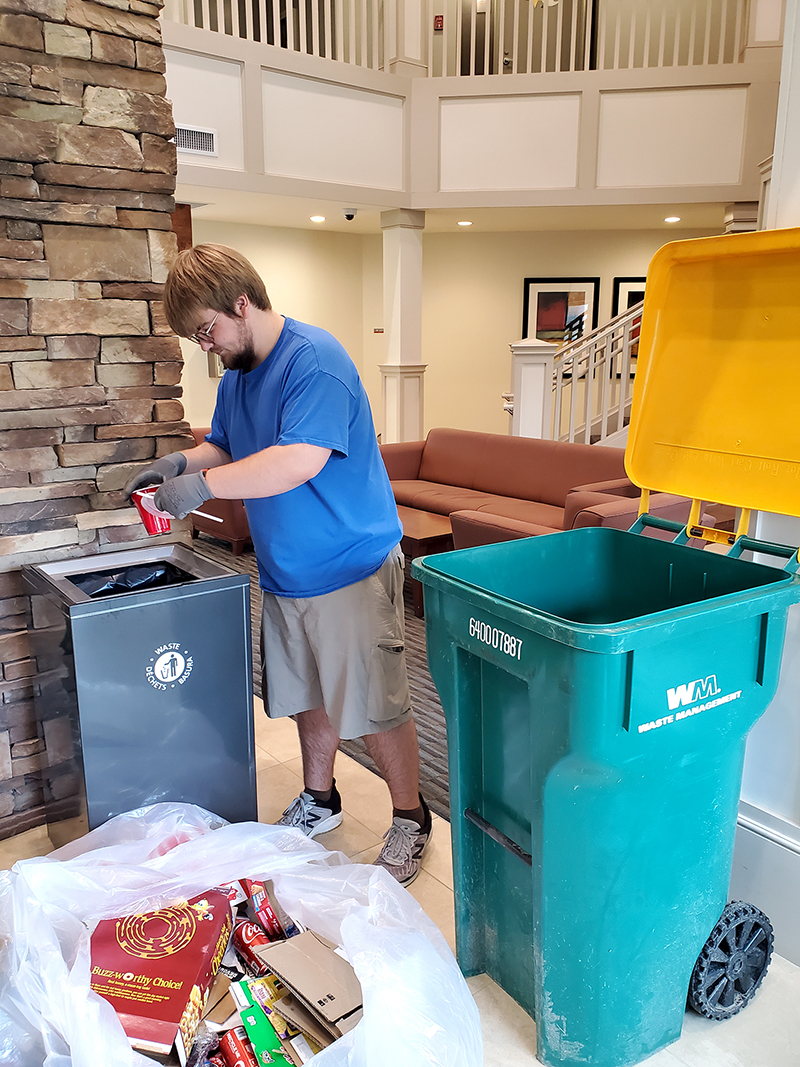
Residence halls to have recycling, landfill bins added to rooms
Last year, student Caitlin Reimers applied for the Green Initiative Fund with the goal of putting recycling and landfill bins in every dorm room on campus.
That project has since become a reality, with every residence hall either installing or planning to install bins in individual rooms this semester.
Reimers, a transfer student from SDSU, said she appreciated the recycling bins provided to students there and missed them when she came to USD. She found out about the Green Initiative Fund, a primarily Student Government Association (SGA) led fund to promote sustainability on campus, and used it to bring the project to fruition.
“After a semester of having makeshift hamper bins that I set up and emptied once a week for my whole floor to use, I couldn’t help but feel that this was putting a band-aid on a cracked dam. I decided I needed to find a more widespread permanent solution to our problem with recycling. I found out about the Green Initiative Fund from a friend and thought I would give it a shot and see if I could do anything about it,” Reimers said in an email interview with The Volante.
Anna Moore, campus recycling coordinator, said the project has been going well so far. She said this semester is the first time that all residence halls will have recycling programs, and that so far, most rooms now have small recycling and landfill bins.
“Having the small bins in people’s rooms has made recycling be the default behavior, and because of that, we’ve seen a lot more recycling in the residence halls than we did last semester in the couple of halls where we had recycling bins as an option,” Moore said.
Reimers said the project’s implementation is a huge step for USD, and she can already see the impact that recycling has had on campus. A large project like this, she said, gives students a precedent for starting conversations about sustainability.
“Maybe it will even encourage USD to create a sustainability office for students like me, who have an idea, to have the proper guidance and resources in the future,” Reimers said.
The recycling bins are attended to by the recycling team, which now numbers seven students. These workers visit the residence halls every weekday to collect recyclable materials.
According to data collected by Moore, between January and August 2021, the team has collected 36.16 tons of recyclable materials. This is more than the totals for 2019 and 2020, which are 24 tons and 19.95 tons, respectively.
Moore said most residents are doing a great job of recycling, but the team still finds non-recyclables like plastic bags, plastic cups, paper towels and tissues in the mix. She said the team spends a fair amount of energy removing those items so Millennium Recycling—the Sioux Falls facility the team takes the recycling to—can process the materials.
One of the most common non-recyclables the team finds, Moore said, are the plastic cups used for iced coffee. Not only is the plastic unable to be recycled, but the liquid from one person’s coffee cup can ruin an entire stack of otherwise recyclable paper, Moore said.
Ross Block, a member of the recycling team, said coffee could contaminate bins to the point where the team needs to take them out of the halls for cleaning, potentially causing them to miss an opportunity to collect recycling.
“They put milk in (coffee). And that milk sits for days and days and days and starts to rot. And then you end up with a bad bag that stinks,” Block said. “If there’s a hole in the bag, any liquid, but coffee especially, can leak through that hole, and you end up with a dirty bin that you then have to take to the shop and wash and let it dry, and then that bin’s out of commission for at least a day.”
To combat these issues, Moore said the team is looking into working with campus dining services to establish a system that allows students to use personal reusable cups for coffee.
While Reimers utilized the Green Initiative Fund to execute her project, the fund itself has undergone changes since last semester. Elizabeth Leibel, the graduate assistant who oversees the Green Initiative Fund, said the guidelines were revised to be less vague about the kinds of projects that are qualified for funding.
Leibel said there have been only two years where the Green Initiative Fund has been used to implement projects—the bike share program in 2017, and the recycling bins program this year. She said there would be good ideas that couldn’t be executed because they weren’t feasible within the given timeframe, budget or existing systems at USD.
The new fund is a two-tier system, she said. Students are now required to outline their ideas, create a timeline and roughly estimate the cost of their project in a pre-proposal for Leibel and Scott Pohlson, chair of the President’s Joint Committee on Sustainability, to review. If the pre-proposal is approved, the two will send revision suggestions back to the student, and they will be asked to submit a full proposal for review by the full Joint Committee on Sustainability.
The five members of SGA who sit on the committee will then take the committee’s recommendations to SGA, which will vote on the project. Leibel said that while SGA ultimately decides which projects receive funding, the Joint Committee on Sustainability recommends the projects with the greatest impact.
“We’re really hoping that these new guidelines and added support will help it grow and help students get excited about it and make sure that there can continue to be these projects,” Leibel said.
The fund isn’t exclusively for large projects like the bike share program and the addition of recycling bins, however. Students can also submit projects for better signage, or even for maintenance of existing projects, Leibel said.
“The more projects that we get and the more potential that (the Green Initiative Fund) has, then hopefully it’s something that continues and there can be more student-led sustainability projects with it.”
The Campus Green Initiative Fund is still accepting applications, and will be open until Oct. 18. More information can be found at www.usd.edu/student-life/sga/campus-green-initiative-fund.


